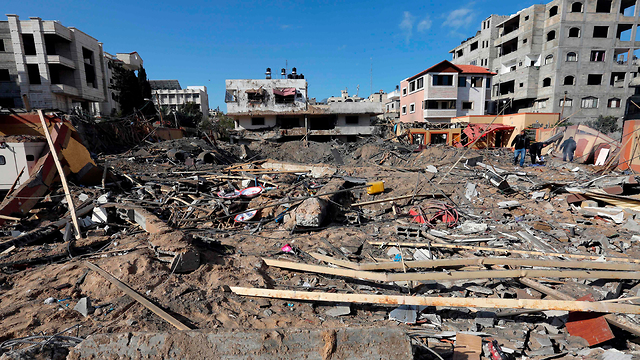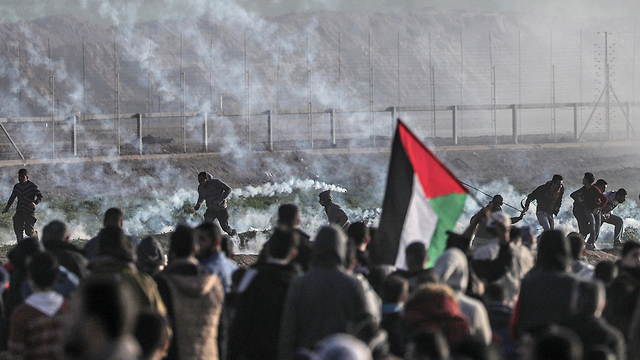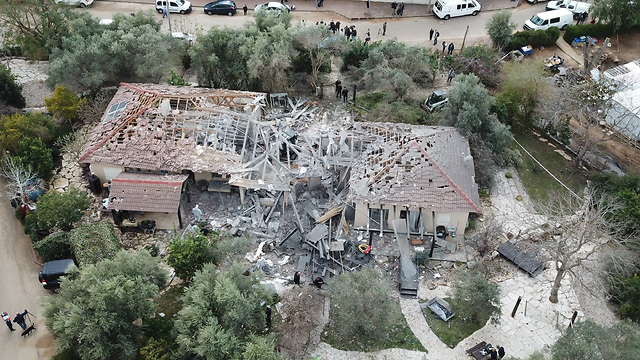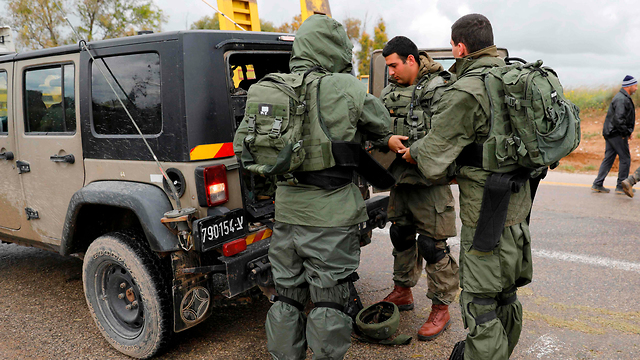Amid the IDF troop increases in the south and the current fighting, Egyptian envoy General Ahmed Abd Khalek, who is responsible for the Palestinian issue in his country's intelligence community, will arrive in Gaza on Wednesday or Thursday with a delegation of officers to push ahead the signing of a memorandum of understanding. He will do so at the request of Hamas.
The memorandum is supposed to guarantee quiet in the coming months. It includes rehabilitation work in Gaza on one hand, and on the other, the end to violence along the Gaza fence and the cessation of airborne firebombs and explosive devices. The signing of this memorandum of understanding between Israel and Hamas, if it comes through, will be the dramatic culmination of a protracted effort.

What happened in the last two days in Gaza was not a military event. As such, the main players were the prime minister and the head of the NSC, not the IDF chief of staff. It was a clearly political maneuver, with the Air Force and the IDF playing the role of leverage.
The rocket fired at Moshav Mishmeret was part of the same behind-the-scenes politicking currently taking place, in which Israel, Egypt and Hamas are all participants. And if an agreement is not signed, we will feel the effects on the ground on Saturday, when Hamas marks the first anniversary of the March of Return protests.
The current round of violence actually began at 9pm on March 14, when Khalek was sitting opposite Hamas leader Yahya Sinwar. On the table between them was a memorandum of understandings ready for his immediate signature. The document includes a series of Israeli and international commitments to the Gaza Strip, along with Hamas' agreement to a list of conditions set by Israel.
This document was formulated at the beginning of March, following Egyptian shuttle diplomacy between Tel Aviv and Gaza, with National Security Council Director Meir Ben-Shabbat pushing for an agreement from the Israeli side.
One of the most important clauses in the document is a commitment by Hamas to refrain from any violent activity along the fence for a period of about a year. But instead of Sinwar signing the document, at five minutes past 9, Hamas fired two long-range rockets at the Tel Aviv region.
The last thing Sinwar subsequently heard from Khalek was that he was not going to go back to mediation, as long as Hamas refused to accept the conditions of the memorandum and instead kept making new demands. It goes without saying that no one in the Middle East, including Egypt and Hamas members themselves, bought the fairytale that the rockets on the Tel Aviv region were fired by accident. The only ones willing to not only swallow this story but also to disseminate it publicly was Israeli intelligence.
The Egyptians assessed that the rocket fire was deliberately carried out by Hamas in order to improve the terms of the arrangement. "You are alone," the Egyptian general told Sinwar. "Do you want war? Just please don't come crying to us to save you. Do you want to long-term calm? Then let us know when you have accepted the conditions."
Indeed, the Egyptians did not answer Hamas phone calls until Monday evening, when the militant group begged for rescue from Israeli air strikes.
Hamas members had signaled their intention to break the rules last Friday, when they not only renewed their violent activities at the fence, but also renewed their tests of long-range missiles.
Sinwar, as is his wont, thought that Israel would start a war with him two weeks before the elections. And so he went to his comfort zone - exploiting the weaknesses of the Netanyahu government, while also taking his own actions to the wire. Therefore, on Monday, he fired a long-range rocket into the center of Israel while the country was sleeping.
This time Israel did not even deign to talk of mistaken launches. The rocket fire was carried out in the intention of improving the conditions of the arrangement, but also had other objectives in mind. Any Gazans protesting Hamas during an Israeli military operation would be painted as traitors. Indeed, the demonstrations and the organized protests against Hamas' rule have ceased.
When the Israeli Air Force began to attack and Israel threatened a large-scale military operation, Hamas quickly pleaded for rescue from Egypt, and apparently expressed willingness to return to the memorandum, which includes stopping the protests at the fence and the airborne firebombs for an extended period. The Egyptians have not publicly used the term "cease-fire."
It is reasonable to assume that Benjamin Netanyahu and his staff were not only in touch with the chief of staff and the head of the Shin Bet during his brief US trip, but also with senior Egyptian officials. It was apparently decided not to declare a cease-fire, but to let Hamas sweat and see how it behaves from now on, especially on the anniversary of the March of Return, which was planned as the most violent day of protests along the fence.
Meanwhile, Hamas has reduced the amount of firebombs it is sending across the border tied to balloons. If it passes the test at the weekend, keeps the violence down and signs the memorandum, the IDF will send its troops back to their bases.





















